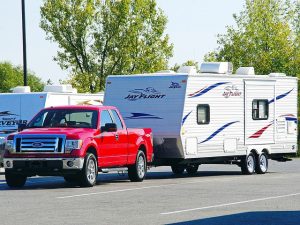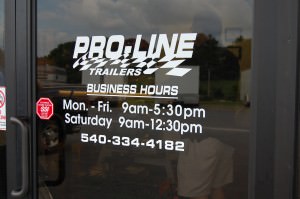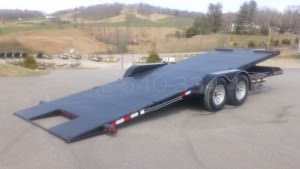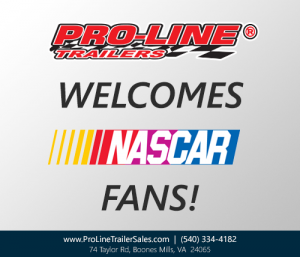Safety Tips for Hauling a Trailer
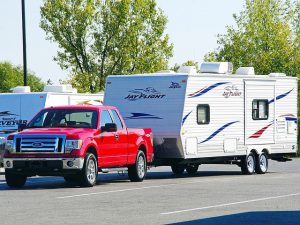 Owning a trailer seems simple enough. It shouldn’t take much maintenance if you only tow it occasionally to haul small items. If you aren’t using it, and the trailer just sits there, it should be fine right?
Owning a trailer seems simple enough. It shouldn’t take much maintenance if you only tow it occasionally to haul small items. If you aren’t using it, and the trailer just sits there, it should be fine right?
Wrong!
No matter if you use your trailer daily or only use it once in a while, it still needs proper maintenance and care to keep it on the road for years to come. By taking the right measures, you can reduce any problems that could arise on the road. Additionally, having the right equipment from the start is the smart way to tow. Don’t take for granted that towing is serious business. Many dangers can await you, so it’s good practice to learn the best ways to stay safe when hauling a trailer on the road.
Know the Weights and Towing Capacity of Your Tow Vehicle and Trailer
Before you ever set out on the road, you need to acquire a vehicle that can handle the demands of the trip. Your owner’s manual can provide information about the vehicles towing capacity. You should have a towing package installed on your vehicle if it does not currently have one. Never attach a trailer to the bumper.
Know your:
- Gross vehicle weight rating (GVWR): the weight limit for your vehicle, including the vehicle itself plus passengers, cargo, and accessories
- Gross combination weight rating (GCWR): the maximum weight of the tow vehicle plus the loaded trailer, equipment, passengers, fuel, and any cargo
- Gross axle weight rating (GAWR): the amount of weight a single axle can safely bear. It’s important to know this value for both your tow vehicle and your trailer
- Towing capacity: the amount of weight your vehicle can pull
- Tongue weight: the amount of the trailer’s weight that is placed on the trailer hitch
1. Hitches and Balls
There are several towing packages available on the market. Make sure you select a towing frame rated to handle the max weight for your vehicle.
Each manufacturer may have specific classifications for their hitches. Be sure to educate yourself on the options available for the brand you have purchased.
Select the Right Ball Size
Unless your trailer has a pin style coupling, your trailer hitch will require a ball to connect to the tongue. Selecting the correct size ball is a requisite to prevent the trailer from “popping off” the ball causing a collision or other problems as a result of a bad connection.
If your trailer tongue requires a 2.5 inch ball, you cannot make due with a 2.25 inch ball. Only exact specifications should be met before towing your trailer.
2. Make sure your Trailer is Level
Keeping your load balanced is essential. This includes front to back, as well as side to side. But, if your trailer hitch is too high for your tongue, you could have a lot of problems out on the road.
Rise or Drop
To keep your trailer level and in line with the tow vehicle, you need to determine if you need your hitch to ‘rise or drop’ to the correct height. This can be determined by subtracting the interior height of the receiver tube from the height of the coupler.
A sum that is positive means a rise is needed. A negative sum means a drop.
3. Tires, Brakes and Trailer Lights
One of the most overlooked components of trailer maintenance are tires.
Since you aren’t using your trailer as often as your tow vehicle, the tires should be fine, right?
Wrong again!
Underused trailers can suffer as well. Tires are very susceptible to dry rot and can literally disintegrate when exposed to the heat, friction and swelling that accompanies operating at highway speeds.
Tires can easily become worn from improper load bearing. Too much weight, underinflated tires, unbalanced load and even general road conditions can ruin your tires in no time. Keep an eye out for uneven wear patterns, especially on the interior side of your tires, which can be hard to see.
Tires that are not properly inflated are a disaster waiting to happen. Check you trailer’s tire pressure to make sure they are properly inflated. Check the tire sidewalls for specification.
Grease Your Wheel Bearings
Trailers used for long distance travels and boat trailers that are submerged in water often, should have their will bearings greased regularly. Adding a set of “Bearing Buddy’s” to your trailer tire rims can make greasing and maintenance as simple as a snap!
Just be careful not to over grease as you can blow the bearings out in the process. Only add enough grease to reduce the metal on metal friction.
Trailer Brakes
If your trailer is equipped with a brake system, then you should have these checked on occasion. Bad brakes can reduce stopping power and cause damage to your rotors. Replacing trailer rotors is as expensive as replacing those on your tow vehicle. By keeping a watchful eye on your trailers brake wear, you can help avoid costly repairs in the future.
Light System
By law your trailer is required to display brake and turn signal lights. Even yellow running lights are equipped on most trailers. Check your connections and make sure your lights work properly before hitting the highway. You can find inexpensive replacement bulbs at your local car parts store.
Loading the Trailer
As stated above, it is essential to load the trailer in a way the distributes weight evenly. This is to avoid overstressing certain components of the trailer and tow system, as well as helping the driver maintain control of the vehicle.
Trailers loaded incorrectly can sway at highway speeds and easily jackknife if the driver is required to stop suddenly.
Correct Cargo Loading:
- All contents are properly tied down and secured
- Trailer contents are equally balanced on each side
- Contents do not exceed the weight capability of the trailer
A Final Check Before Getting Out On the Road
Before getting on the roadway, take a moment and run through a quick checklist of each of the following items.
This should be done every time you put your vehicle on the road.
Make sure the:
- Hitch ball is tightly secured
- Coupler or socket is secured and locked over the ball with a pin and clip
- Wires have not been damaged from storage or last trip
- Safety chains are properly attached and secured
- The tongue jack is fully up and properly stowed
- All wiring harnesses have been properly attached and are working correctly
- Check trailer for damage and loose parts like screws and bolts
Trailer Safety When Traveling
Once out on the highway, many unexpected scenarios can pop up. While not all situations can be predicted, here are some essential tips to help you avoid problems when traveling.
Be sure:
- When towing a trailer, take the weight of the trailer and the contents of the trailer into consideration
- Leave enough distance between you and the car in front of you to stop. The extra weight will reduce braking ability
- Remember the contents of your trailer when braking hard. Sudden movements can dislodge items and cause shifting of cargo
- Make wider turns to avoid running over curbs
- Leave lots of excess room when changing lanes and passing. Take every precaution
- Cars following you will tend to tailgate. They are not aware of your inability to stop, so it is up to you to be more vigilant when on the roadway
- If your trailer begins to sway, release the accelerator pedal to reduce your speed. Do not apply the brakes as this can make the sway worse
- Check your trailer contents periodically throughout your trip to ensure nothing has been lost
Get Your Trailer Set Up at Pro-line Trailer Sales!
Getting out on the road and staying safe while you are hauling a trailer is a top priority. When your trailer needs maintenance, contact the team at the Pro-line Trailer Sales service department for quality service. If you need a new trailer tongue, brake system repair or other trailer parts, the team at Proline Trailer Sales is ready to help.
Find out how we can help you this summer by giving us a call at (540) 334-4182 or by taking a look at our selection of fine trailers.
Related Reading: 3 Tips for Towing a Trailer Safely

